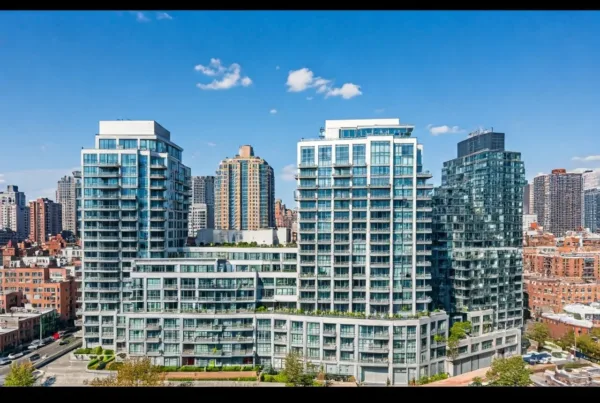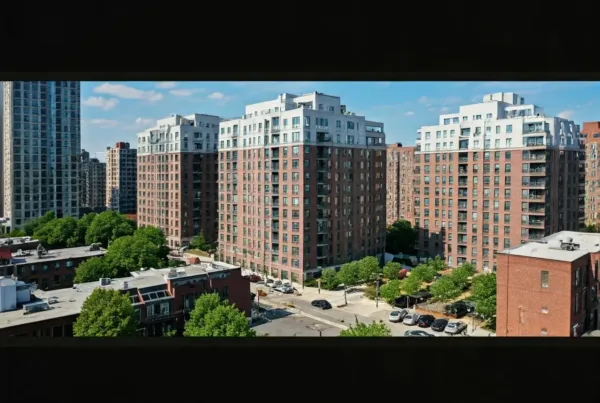Unlock the secrets to purchasing a co-op unit with our comprehensive buyer’s guide – find your dream home today!
Table of Contents
Introduction to Co-Op Units
Have you ever heard of co-op units? If you’re thinking about buying a home, co-op units could be a great option for you. Let’s dive into what they are and why they might be the perfect fit for your next home.
What is a Co-Op Unit?
So, what exactly is a co-op unit? Well, a co-op, short for cooperative, is a type of housing where you don’t technically own your unit like you would with a traditional house. Instead, you become a member of a corporation that owns the entire building. This means you have a share in the corporation, and in return, you get to live in one of the units. It’s kind of like being part of a big housing club!
How Does a Co-Op Work?
When you buy a co-op unit, you’re not just purchasing the space you’ll live in—you’re also buying into the community of the building. This community aspect is one of the cool things about co-op living. Members of the co-op usually have a say in decisions about the building, like changes to the common areas or rules for residents.
Benefits of Owning a Co-Op Unit
There are some neat perks to owning a co-op unit. Because you’re part of a larger group that owns the building, costs like maintenance and repairs are often shared among all the members. This can mean big savings for you! Plus, living in a co-op can give you a real sense of community—you’ll get to know your neighbors and work together to make your building a great place to live.
Finding Co-Op Units for Sale
When searching for co-op units for sale, there are several sources and platforms you can explore. Websites like Realtor.com, Zillow, and Trulia often have listings for co-op units in various locations. Additionally, you can check local real estate agencies, newspapers, and community bulletin boards for available units.
Working with Real Estate Agents
Real estate agents play a crucial role in helping buyers find the right co-op unit. They have access to a wide range of listings and can guide you through the entire buying process. If you’re looking for a sponsor unit for sale in NYC or any other location, a real estate agent can help you navigate the market and make informed decisions.
Understanding Listings
When browsing through co-op unit listings, it’s essential to understand the information provided. Look for details on the unit’s size, number of bedrooms, amenities, and monthly maintenance fees. Pay attention to any restrictions set by the co-op board and make sure the unit meets your needs and expectations.
What is a Sponsor Unit?
A sponsor unit is a type of apartment within a cooperative building that is owned by the original developer or sponsor of the building. These units are typically sold by the sponsor and are often different from regular co-op units.
Definition of a Sponsor Unit
In simple terms, a sponsor unit is a special type of apartment in a co-op building that is owned by the developer who initially built the property. The sponsor has the right to sell these units independently from the other co-op units in the building.
Benefits of Buying a Sponsor Unit
One of the advantages of purchasing a sponsor unit is that they are usually less restrictive than regular co-op units. This means that buyers may not have to go through the same rigorous approval process by the co-op board, making the buying process faster and easier.
Sponsor units are also often priced competitively, as the sponsor may be motivated to sell them quickly. Additionally, some sponsor units may come with unique features or upgrades that differentiate them from other units in the building.
Challenges of Sponsor Units
However, there are some potential challenges to consider when buying a sponsor unit. Since the sponsor still owns these units, they may have control over certain aspects of the building or the unit itself. This could lead to issues with maintenance, renovations, or other decisions that affect the unit owner.
Buyers should also be aware that the resale value of a sponsor unit may be impacted by the fact that it is not subject to the same resale restrictions as regular co-op units. It’s important to carefully consider all aspects of purchasing a sponsor unit before making a decision.
The Buying Process
When you decide to buy a co-op unit, the first step is to search for the right one. Look at different listings online or in newspapers. Consider what features are important to you, like the number of bedrooms, location, and amenities.
| Co-Op Building | Location | Unit Size | Price | Contact |
|---|---|---|---|---|
| The Plaza | 123 Main St. | 800 sq. ft. | $350,000 | John Doe (555) 123-4567 |
| Riverfront Place | 456 Elm St. | 1,200 sq. ft. | $500,000 | Jane Smith (555) 987-6543 |
| Harbor Towers | 789 Pine St. | 950 sq. ft. | $400,000 | Mike Johnson (555) 222-3333 |
Making an Offer
After finding a co-op unit you like, it’s time to make an offer. This means telling the seller how much you are willing to pay for the unit. Think about your budget and what other similar units are selling for in the area.
Financing the Purchase
To buy a co-op unit, you may need to get a loan from a bank, also known as a mortgage. This is money that you borrow to pay for the unit. Make sure to compare different mortgage options to find the best one for you.
Closing the Deal
Once your offer is accepted and you have your financing in place, it’s time to close the deal. This means signing a lot of paperwork and paying for the unit. After that, the co-op unit will officially be yours!
Tips and Things to Consider
Before diving into buying a co-op unit, it’s crucial to research the co-op board. This governing body sets the rules and regulations for the entire building, affecting your daily life as a resident. Make sure to review their policies, fees, and any restrictions they may have. Understanding their requirements will help you determine if the co-op is the right fit for you.
Check the Building’s Financial Health
Another essential step is to check the financial health of the co-op building. Ensure the building has a healthy reserve fund to cover any unexpected repairs or maintenance costs. You can request financial documents like budgets and reserve studies to evaluate the building’s financial stability. A financially stable building is less likely to impose hefty special assessments on its residents.
Visit Multiple Units
When exploring co-op and sponsor units, it’s beneficial to visit multiple units before making a decision. By touring different units, you can compare layouts, views, amenities, and overall conditions. This firsthand experience allows you to assess which unit meets your requirements and preferences. Don’t settle for the first unit you see; explore your options to find the perfect match.
Conclusion
In this article, we delved into the world of co-op units and the intricacies of buying one. We started by exploring what a co-op unit is and how it differs from condos and apartments. Understanding how a co-op works, the benefits it offers, and the sense of community it provides can guide potential buyers in making informed decisions.
When it comes to finding co-op units for sale, we emphasized the importance of knowing where to look, how to work with real estate agents, and how to interpret listings effectively. These steps are crucial in the process of finding the perfect co-op unit that suits your needs and preferences.
Furthermore, we discussed the concept of sponsor units and the advantages and challenges associated with purchasing one. Knowing the differences between regular co-op units and sponsor units, especially in bustling cities like NYC, can help buyers make strategic decisions.
As we navigated through the buying process, from searching for the right unit to closing the deal, we highlighted essential steps like making an offer, financing the purchase, and finalizing the transaction. These steps are the foundation of a successful co-op unit purchase.
Lastly, we provided valuable tips and considerations for buyers, including researching the co-op board, checking the building’s financial health, and visiting multiple units. These insights can help buyers make informed choices and avoid potential pitfalls in the buying process.
By understanding the nuances of co-op units, buyers can embark on their purchasing journey with confidence and clarity. Whether you’re looking for a co-op unit or a sponsor unit in Queens or elsewhere, the key is to stay informed, diligent, and proactive throughout the process.
FAQs
What is the difference between a co-op and a condo?
Co-op units and condos are both types of housing, but they have some key differences. In a co-op, you’re buying shares in a corporation that owns the entire building, while in a condo, you own your individual unit outright. Co-ops often have stricter rules and regulations, including approval processes for buyers and potential restrictions on renting out your unit. Condos typically offer more flexibility and ownership rights.
How long does it take to buy a co-op unit?
The timeline for buying a co-op unit can vary, but it generally takes longer than purchasing a condo or a house. The process typically involves submitting an application to the co-op board, which can take several weeks to review. Once approved, you’ll need to secure financing, conduct inspections, and finalize the sale, which can add more time to the process. In total, it could take a few months to complete the purchase of a co-op unit.
Can I rent out my co-op unit?
Begin your search and start earning cash back!
Whether you can rent out your co-op unit depends on the rules set by the co-op board. Some co-ops have strict regulations against renting out units, while others may allow it under certain conditions. It’s important to review the co-op’s bylaws and guidelines to understand the rules around renting. Additionally, even if renting is allowed, you may need board approval and there could be restrictions on the length of time you can rent out your unit.







